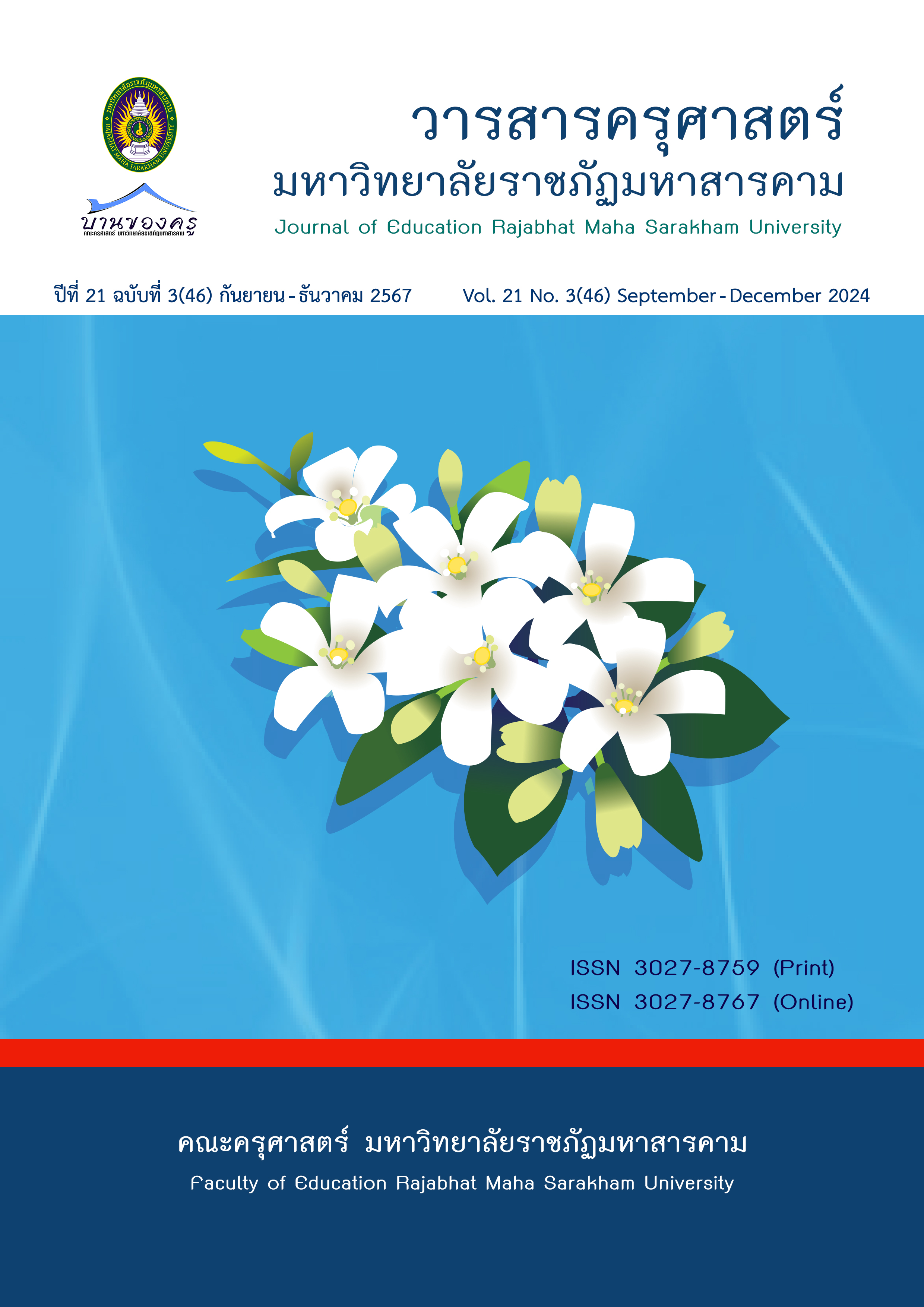Development of Interpersonal Skills for Educational Graduate Students in Biology Program Through Resilience Theory and Emotional Intelligence
Main Article Content
Abstract
This research study purpose was to compare the interpersonal skills of undergraduate students between before and after learning management based on resilience theory and emotional intelligence. This research methodology was processed on Quasi-Experimental designs. The samples group was 26 undergraduate students of biology education program, in the academic year 2024 from cluster random sampling. The research instruments consisted of (1) the 8 instructional plans of learning management based on resilience theory and emotional intelligence, assigned learning time for 3 hours per plan and total of period time was 24 hours. Each plan provided learning activities in 5 steps, these were: (1.1) Engagement and reviewing of prior knowledge, (1.2) Learning new knowledge and conclude with key concept, (1.3) Summarizing concept and exchanging knowledge, (1.4) Applying of valuable knowledge with rationale, and (1.5) Evaluation of learning outcome and interpersonal skills and (2) The student’s interpersonal skills assessment form for five component with 20 items. This research result were analyzed through average score, standard deviation, and test the research hypothesis with t-test for dependent samples.
The research result revealed that the students in the learning management based on resilience theory and emotional intelligence showed higher of interpersonal skills after the learning than before the learning at the .05 level of significance.
Article Details

This work is licensed under a Creative Commons Attribution-NonCommercial-NoDerivatives 4.0 International License.
ข้อกำหนดเบื้องต้นที่ผู้นิพนธ์(ผู้ส่งบทความ) ควรทราบ
1. ผู้นิพนธ์ที่ประสงค์จะลงตีพิมพ์บทความกับวารสาร ตั้งแต่เดือนมกราคม 2563 เป็นต้นไป ให้ใช้รูปแบบใหม่ (Template 2563) โดยสามารถดูตัวอย่างได้ที่เมนู GUIDELINES
2. จะตีพิมพ์และเผยแพร่ได้ ต้องผ่านการประเมินจากผู้ทรงคุณวุฒิ (Peer Review)
3. การประเมินบทความโดยผู้ทรงคุณวุฒิ (Peer Review) เป็นแบบ Double Blind
4. การอ้างอิงบทความใช้หลักเกณฑ์ APA (American Psychological Association) คลิก
5. บทความถูกปฏิเสธการตีพิมพ์ ไม่ผ่านการประเมิน ผู้นิพนธ์ขอยกเลิกเองหรือชำระเงินก่อนได้รับการอนุมัติ ทางวารสารไม่มีนโยบายการคืนเงิน
References
ข้อบังคับคุรุสภา ว่าด้วยมาตรฐานวิชาชีพ (ฉบับที่ 4) พ.ศ. 2562. (2563, 7 พฤษภาคม). ราชกิจจานุเบกษา (เล่ม 137 ตอนพิเศษ 109ง, น. 10-14).
อนุสิษฐ์ พันธ์กล่ำ. (2560). ผลการพัฒนาทักษะความสัมพันธ์ระหว่างบุคคลและความรับผิดชอบโดยใช้บทบาทสมมุติสำหรับนักศึกษาวิชาชีพครู, วารสารครุศาสตร์ คณะครุศาสตร์ มหาวิทยาลัยราชภัฏกำแพงเพชร, 2(4), 77-89.
Block, J. H., & Block, J. (1980). The role of ego-control and ego resiliency in the organization of behavior. In W. A. Collins (Ed.), Minnesota symposium on child psychology, 13, 39-101.
Bodin, P., & Winman, B. (2004). Resilience and other stability concepts in ecology: Notes on their origin, validity and usefulness. ESS Bulletin, 2, 33-43.
Cavallo, K. (2000). Emotional Competence and Leadership Excellence at Johnson & Johnson: The Emotional Intelligence and Leadership Study.
Connor, K. M., & Davidson, J. R. T. (2003). Development of a new resilience scale: The Connor-Davidson resilience scale (CD-RISC). Depression and Anxiety, 18, 76-82.
Earvolino-Ramirez (2007). Resilience: A concept analysis. Nursing Forum, 73-82.
Espiner, T. (2007). Survey: People skills valued over those for IT. CNET News.
Fletcher, D., & Fletcher, J. (2005). A meta-model of stress, emotions and performance: Conceptual foundations, theoretical framework, and research directions [Abstract]. Journal of Sports Sciences, 23, 157-158.
Fletcher, D., & Sarkar, M. (2012). A grounded theory of psychological resilience in Olympic champions. Psychology of Sport and Exercise, 13, 669-678.
Fletcher, D., & Scott, M. (2010). Psychological stress in sports coaches: A review of concepts, theory and research. Journal of Sports Sciences, 28, 127-137.
Galli, N., & Vealey, R. S. (2008). “Bouncing back” from adversity: Athletes’ experiences of resilience. The Sport Psychologist, 22, 316-335.
Goleman, D. (1995). Emotional Intelligence. New York, NY: Bantam.
Goleman, D. (2019). The Emotionally Intelligent Leader. Boston, Massachusetts: Harvard Business School Publishing, Co, 11-13.
Goleman D., Boyatzis R., McKee A. (2013). Primal Leadership: Learning to Lead with Emotional Intelligence. Boston: Harvard Business Press.
Hayes, J. (2002). Interpersonal skills at work. New York: Routledge.
Higgins, C. A., & Judge, T. A. (2004). The effects of applicant influence tactics on recruiter perceptions of fit and hiring recommendations: A field study. Journal of Applied Psychology, 89(4), 622-632.
Kidd, S., & Shahar, G. (2008). Resilience in homeless youth: The key role of self-esteem. American Journal of Orthopsychiatry, 78, 163-172.
Luthar, S. S. (2006). Resilience in development: A synthesis of research across five decades. In D. Cicchetti, & D. Cohen (Eds.), Developmental psychopathology: Risk, disorder, and adaptation (pp. 739-795). New York: Wiley.
Mahoney, J. L., & Bergman, L. R. (2002). Conceptual and methodological considerations in a developmental approach to the study of positive adaptation. Applied Developmental Psychology, 23, 195-217.
Major, B., Richards, C., Cozzarelli, C., Cooper, M. L., & Zubek, J. (1998). Personal resilience, cognitive appraisals and coping: An integrative model of adjustment to abortion. Journal of Personality and Social Psychology, 74, 735-752.
Mayer, J. D., Salovey, P., & Caruso, D. R. (2004). Emotional intelligence: Theory, findings, and implications. Psychological Inquiry, 15(3), 197–215.
Mayer, J. D. & Salovey, P. (1990). Emotional Intelligence. Imagination, Cognition and Personality, 9(3), 189.
Neenan, M. (2009). Developing resilience. Hove: Routledge.
Pumaleque, A. A. P. ., Arbulu, A. C. A. ., Calle, C. A. P. ., & Gutierrez, F. H. P. . (2021). EMOTIONAL INTELLIGENCE MODEL TO IMPROVE RESILIENCE IN UNIVERSITY STUDENTS. The Journal of Contemporary Issues in Business and Government, 27(2), 634–4642.
Richardson, G. E. (2002). The metatheory of resilience and resiliency. Journal of Clinical Psychology, 58, 307-321.
Spector, P. E., & Jex, S. M. (1998). Development of four self-report measures of job stressors and strains: Interpersonal Conflict at Work Scale, Organizational Constraints Scale, Quantitative Workload Inventory, and Physical Symptoms Inventory. Journal of Occupational Health Psychology, 3, 356-367.
Waller, M. A. (2001). Resilience in eco-systemic context: Evolution of the concept. American Journal of Orthopsychiatry, 71, 290-297.
Williams, M. J. (2011). Home, school, and community factors that contribute to the educational resilience of urban, African American high school graduates from low-income, single-parent families (PhD thesis, University of Iowa).
Windle, G. (2011). What is resilience? A review and concept analysis. Reviews in Clinical Gerontology, 21, 152-169.


